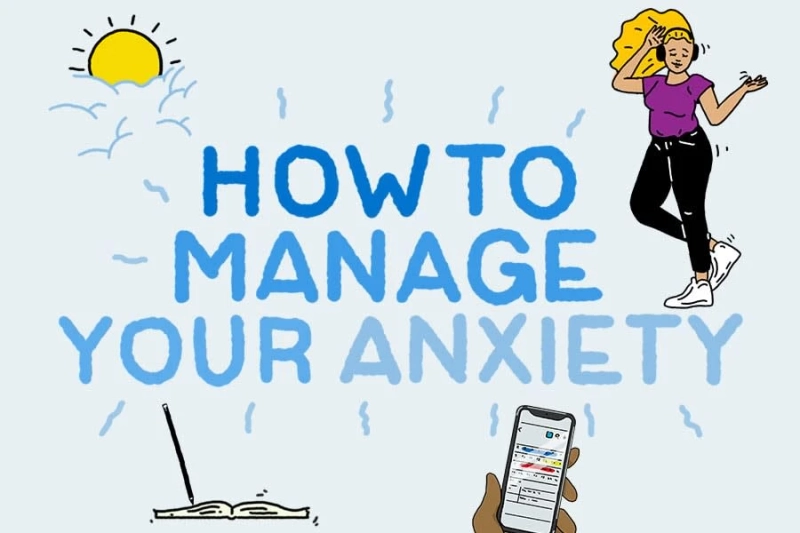Overview
Anxiety disorders and sleep problems have a complex and mutually beneficial relationship that has a substantial impact on people's well-being within the complex fabric of mental health. Disorders related to anxiety and sleep are frequently coexisting, resulting in a difficult cycle where one aggravates the other. This article explores the complex relationship between anxiety and sleep difficulties, highlighting the symptoms that link them and offering practical solutions to end this vicious cycle.
Section 1: Dissecting the Relationship Between Sleep Disorders and Anxiety
Anxiety and sleep difficulties have a reciprocal relationship in which each disease influences and exacerbates the other. People who deal with anxiety frequently find themselves in a paradoxical conflict where sleep becomes difficult to come by, which has a series of negative effects on their physical and mental health.
Section 2: The Overlap of Symptoms
Symptoms related to emotions:
Excessive concern, fear, and restlessness are common signs of anxiety, which makes it difficult to unwind mentally. Contrarily, sleep disorders show themselves as challenges getting to sleep, remaining asleep, or getting restorative sleep. Sleep disorders are characterized by cognitive arousal, which can be exacerbated by the emotional symptoms of worry.
Symptoms of cognition:
Throughout the night, persistently worrisome ideas can flood the mind, causing racing thoughts and difficulty quieting the mind. In addition to making anxiety worse, these cognitive symptoms prevent the body from naturally transitioning into the various sleep stages.
Symptoms in the body:
Increased heart rate and tense muscles are two physical signs of anxiety that can lead to heightened physiological arousal. The body's capacity to go from this alertness to the relaxed state required for sleep is disrupted, which makes the cohabitation of anxiety and sleep disturbances even more difficult.
Section 3: The Effect on Architecture of Sleep
Anxiety has a significant impact on how sleep is structured. Anxiety can cause sleep disorders such as insomnia or sleep onset disorders, as well as act as a symptom of anxiety. To fully appreciate the depth of this complex relationship, one must grasp the changes in sleep patterns, such as decreased deep sleep and increased awakenings.
Section 4: Mechanisms and Causes
Unbalanced Neurotransmitters:
Gamma-aminobutyric acid (GABA) and serotonin are two neurotransmitters whose delicate balance is crucial for the control of anxiety and sleep. Both diseases appear and persist as a result of disruptions in these neurotransmitter systems.
Hyperarousal: People who suffer from anxiety frequently go into a hyperarousal state, in which their sympathetic nervous system is overactive. This hypervigilant state can last far into the night, which makes it difficult to attain the kind of relaxation required for the onset and maintenance of sleep.
Section 5: Acknowledging the Treatment Need
Seeking the right treatment begins with realizing how closely anxiety and sleep issues are related. People who are having ongoing symptoms might think about speaking with medical experts who specialize in mental health and sleep disorders.
Section 6: Methods of Treatment
Psychotherapy: In order to break the pattern, cognitive behavioral therapy for insomnia (CBT-I) and other psychotherapies specifically designed to treat anxiety are essential. The goal of these therapy modalities is to change maladaptive beliefs and actions that fuel these two diseases.
Drugs:
Pharmacological therapies, like sleep aids and anxiolytics, can be prescribed with a doctor's supervision. The use of medications must be closely monitored in order to reduce the risk of side effects and reliance.
Changes in Lifestyle:
Anxiety and sleep can be positively impacted by putting healthy sleep hygiene habits into practice, such as keeping a regular sleep schedule, setting up a comfortable sleeping environment, and reducing stimulants.
Section 7: Formulating Coping Mechanisms
Cognitive Techniques: Using mindfulness, meditation, and relaxation techniques can help control racing thoughts and create a more relaxed state of mind that is better for falling asleep.
Sleep Restriction Therapy: Managed by a medical practitioner, a systematic approach to sleep restriction can help control sleep cycles and enhance the general quality of sleep.
Section 8: Difficulties in Therapy
intricate interaction:
The complex interrelationship between anxiety disorders and sleep disturbances presents particular treatment concerns. Developing therapies that target both problems at the same time necessitates a thorough and customized strategy.
Comorbid illnesses: Comorbid mental health illnesses are frequently experienced by those who suffer from anxiety and sleep disturbances. Achieving overall well-being requires addressing these conflicting issues.
In summary
In summary, the relationship between anxiety and sleep disturbances is a complex issue that necessitates an all-encompassing comprehension and therapeutic strategy. Through deciphering the complex network of symptoms and executing efficacious actions, individuals can facilitate enhanced sleep quality and diminished anxiety. With the correct resources and expert advice, the symbiotic fight may be overcome, providing promise for improved mental health and a good night's sleep.



